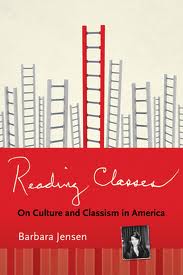By Betsy Leondar-Wright
And unlike most things I’ve read about kids disengaged from school, which focus on their deficits and fret about their life chances, Jensen, a counseling psychologist who has long worked with such kids, celebrates the working-class cultural strengths that motivate some of them, even as she is realistic about their struggles.
Reading this wise and evocative book through my own lens of wanting to organize progressive social movements, I saw that the working-class cultural traits she describes are some of the essentials of movement-building.
“If there’s no rebel energy, there’s no movement,” the late working-class activist Bill Moyer wrote in Doing Democracy. He didn’t mean violent rebellion or randomly scattered rage, but strategically targeted rebellion against unjust power-holders. Tame tactics would never make social change. Looking around at the devastation in the U.S. economy and environment, it’s clear that too many of us are taking terrible injustices sitting down. We have a society-wide shortage of rebel energy, as Bruce Levine.
In the fieldwork for my dissertation, Missing Class, I talked with some decidedly non-rebellious working-class members of the 25 groups I studied. Most were Christians who prided themselves on their respectability; for them, involvement in a community group or union was just another form of giving back to the community, like helping neighbors in need, or coaching youth sports. Some felt disempowered and avoided public roles. But there was another subset of working-class activists who I call “the outlaws”: they prided themselves on their toughness, they scorned respectability, and some were formidable, kick-ass leaders.
The qualities that made these outlaw activists so powerful were the very qualities Jensen herself had as a child and that she identifies as working-class cultural strengths, in particular in her chapter on “Identity and Resistance”:
- The courage and toughness to flout authority and to speak up, even if it means getting in trouble;
- Skills at disruption, resistance and subversion of authority;
- Solidarity and loyalty, the willingness to forgo individual rewards to stand with your peers; less of the competitive individualism that plagues middle-class activist groups;
- Skepticism about slick arguments and official lines;
- Anger at being disrespected, “a more forward-moving emotion than despair.”
Jensen grew up to be an activist and an advocate for other working-class-background people. Her childhood resistance to authority was good preparation for new and effective forms of mouthing off. She says of her own and other straddlers’ struggles to integrate two class identities, “When we engage in activities that save others from injustices we have endured, we make new meaning of those obstacles and our lives.”
But most young working-class rebels do not channel their resistance into collective action – a great loss to social movement building. What would it take for more rebellious working-class youth to become progressive activists?
I’d like to start a discussion with Mobilizing Ideas readers about this question. Who can be the mentors and the role models for class-proud working-class kids to become feisty activists? Only people who are from working-class backgrounds themselves? Middle-class teachers, Jensen says, have only the skills to teach working-class kids to assimilate. Must the same be true for middle-class community organizers and labor organizers? Are cross-class bridgers from privileged backgrounds a rare breed of gifted people, or can this ability be taught? What do you think?
My hope for a better world is resting on the recognition by working-class-background people that their roots give them strengths, that total assimilation must be avoided, and the recognition by teachers, social workers and organizers of working-class strengths to be cultivated instead of squashed. Reading Classes, more than any other book I’ve ever read, is going to make this recognition happen.


Pingback: June Essay Dialogue: Great Books for Summer Reading | Mobilizing Ideas
In a society drowning in debates over sexism and racism, classism was largely ignored by the mainstream until just recently when it was brought to the public’s attention in an almost literal form of war known as class warfare. Barbara Jensen has been at the forefront of class studies for as long as her career, at least. She was pioneering awareness of this new ism long before it became part of our common vernacular. Many fine people are involved in this niche area of academia, and I would bet that a fair number of them have been influenced in some way by her impressions and ideas. If you’ve ever been to a seminar or a lecture of hers then you know of her wit and natural ease on stage. She can engage an entire audience with ease and verbally bridge the gap between the classes, making complex ideas easily digestible to anyone. She is an amazing woman who deserves to be out there in the public eye and recognized for her contributions to the field. (*stephen colbert* hint hint*)
LikeLike